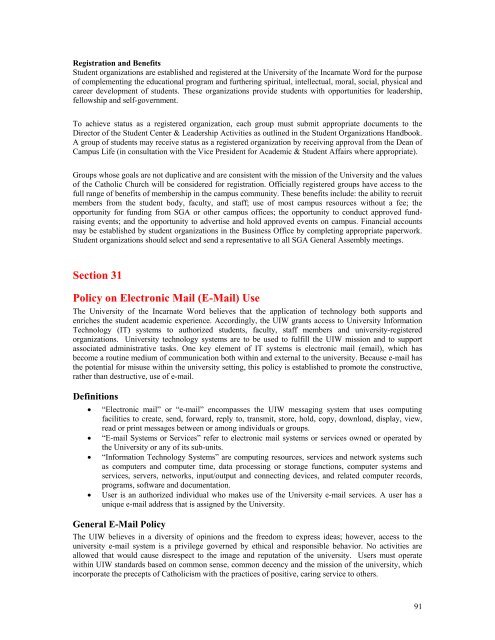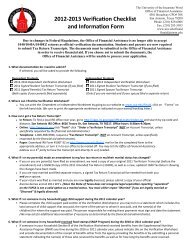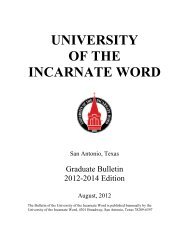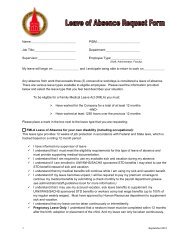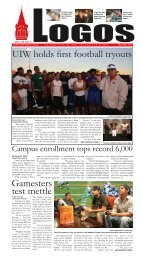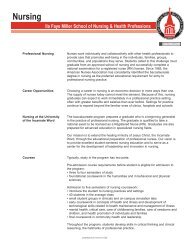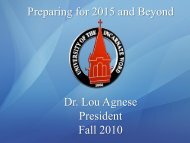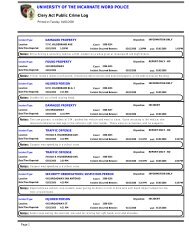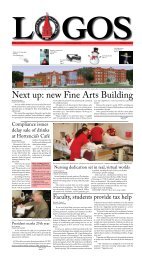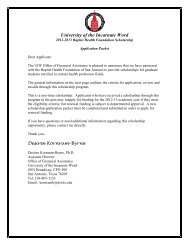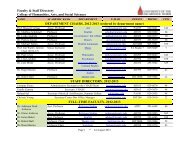2006-2007 Student Handbook - University of the Incarnate Word
2006-2007 Student Handbook - University of the Incarnate Word
2006-2007 Student Handbook - University of the Incarnate Word
You also want an ePaper? Increase the reach of your titles
YUMPU automatically turns print PDFs into web optimized ePapers that Google loves.
Registration and Benefits<strong>Student</strong> organizations are established and registered at <strong>the</strong> <strong>University</strong> <strong>of</strong> <strong>the</strong> <strong>Incarnate</strong> <strong>Word</strong> for <strong>the</strong> purpose<strong>of</strong> complementing <strong>the</strong> educational program and fur<strong>the</strong>ring spiritual, intellectual, moral, social, physical andcareer development <strong>of</strong> students. These organizations provide students with opportunities for leadership,fellowship and self-government.To achieve status as a registered organization, each group must submit appropriate documents to <strong>the</strong>Director <strong>of</strong> <strong>the</strong> <strong>Student</strong> Center & Leadership Activities as outlined in <strong>the</strong> <strong>Student</strong> Organizations <strong>Handbook</strong>.A group <strong>of</strong> students may receive status as a registered organization by receiving approval from <strong>the</strong> Dean <strong>of</strong>Campus Life (in consultation with <strong>the</strong> Vice President for Academic & <strong>Student</strong> Affairs where appropriate).Groups whose goals are not duplicative and are consistent with <strong>the</strong> mission <strong>of</strong> <strong>the</strong> <strong>University</strong> and <strong>the</strong> values<strong>of</strong> <strong>the</strong> Catholic Church will be considered for registration. Officially registered groups have access to <strong>the</strong>full range <strong>of</strong> benefits <strong>of</strong> membership in <strong>the</strong> campus community. These benefits include: <strong>the</strong> ability to recruitmembers from <strong>the</strong> student body, faculty, and staff; use <strong>of</strong> most campus resources without a fee; <strong>the</strong>opportunity for funding from SGA or o<strong>the</strong>r campus <strong>of</strong>fices; <strong>the</strong> opportunity to conduct approved fundraisingevents; and <strong>the</strong> opportunity to advertise and hold approved events on campus. Financial accountsmay be established by student organizations in <strong>the</strong> Business Office by completing appropriate paperwork.<strong>Student</strong> organizations should select and send a representative to all SGA General Assembly meetings.Section 31Policy on Electronic Mail (E-Mail) UseThe <strong>University</strong> <strong>of</strong> <strong>the</strong> <strong>Incarnate</strong> <strong>Word</strong> believes that <strong>the</strong> application <strong>of</strong> technology both supports andenriches <strong>the</strong> student academic experience. Accordingly, <strong>the</strong> UIW grants access to <strong>University</strong> InformationTechnology (IT) systems to authorized students, faculty, staff members and university-registeredorganizations. <strong>University</strong> technology systems are to be used to fulfill <strong>the</strong> UIW mission and to supportassociated administrative tasks. One key element <strong>of</strong> IT systems is electronic mail (email), which hasbecome a routine medium <strong>of</strong> communication both within and external to <strong>the</strong> university. Because e-mail has<strong>the</strong> potential for misuse within <strong>the</strong> university setting, this policy is established to promote <strong>the</strong> constructive,ra<strong>the</strong>r than destructive, use <strong>of</strong> e-mail.Definitions• “Electronic mail” or “e-mail” encompasses <strong>the</strong> UIW messaging system that uses computingfacilities to create, send, forward, reply to, transmit, store, hold, copy, download, display, view,read or print messages between or among individuals or groups.• “E-mail Systems or Services” refer to electronic mail systems or services owned or operated by<strong>the</strong> <strong>University</strong> or any <strong>of</strong> its sub-units.• “Information Technology Systems” are computing resources, services and network systems suchas computers and computer time, data processing or storage functions, computer systems andservices, servers, networks, input/output and connecting devices, and related computer records,programs, s<strong>of</strong>tware and documentation.• User is an authorized individual who makes use <strong>of</strong> <strong>the</strong> <strong>University</strong> e-mail services. A user has aunique e-mail address that is assigned by <strong>the</strong> <strong>University</strong>.General E-Mail PolicyThe UIW believes in a diversity <strong>of</strong> opinions and <strong>the</strong> freedom to express ideas; however, access to <strong>the</strong>university e-mail system is a privilege governed by ethical and responsible behavior. No activities areallowed that would cause disrespect to <strong>the</strong> image and reputation <strong>of</strong> <strong>the</strong> university. Users must operatewithin UIW standards based on common sense, common decency and <strong>the</strong> mission <strong>of</strong> <strong>the</strong> university, whichincorporate <strong>the</strong> precepts <strong>of</strong> Catholicism with <strong>the</strong> practices <strong>of</strong> positive, caring service to o<strong>the</strong>rs.91


